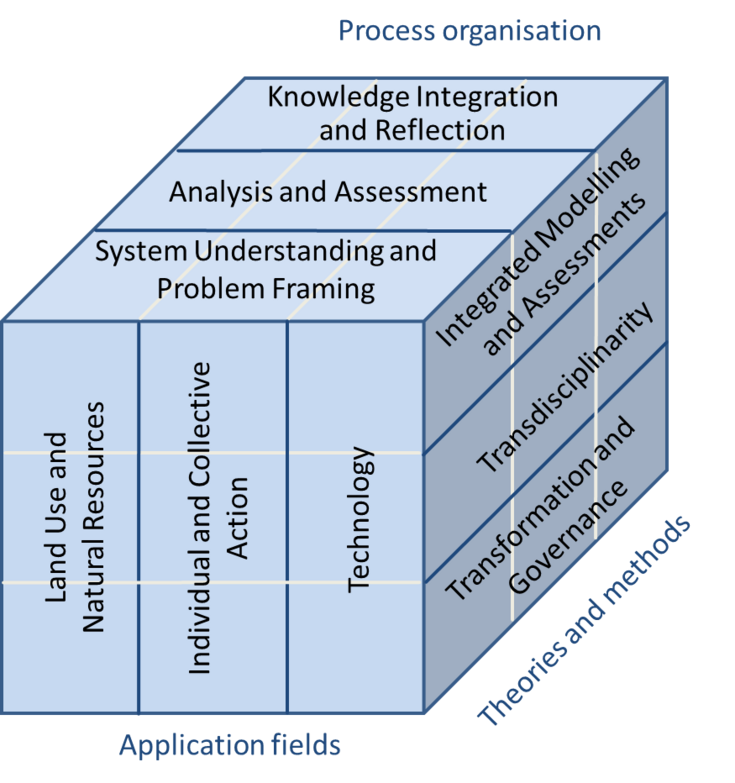RESEARCH
T2S projects are problem-oriented, address real-life problems and aim at context-specific real-life solutions with a normative orientation towards the UN Agenda 2030. Research in T2S is structured along the following dimensions of sustainability science - the “T2S cube”:
- theories and methods (disciplinary, inter- and transdisciplinary methods for co-creating systems knowledge, target and transformation knowledge);
- application fields (land use and natural resources, individual and collective action, technology)
- process organisation (problem framing, in-depth analysis, design, monitoring, and evaluation of intervention and transition pathways)
Shared theoretical and methodological approaches: Many sustainability problems come with high levels of uncertainty and high decision stakes. Therefore, T2S supports new forms of knowledge production - also referred to as ‘Mode 2 Science’, ‘Post-Normal Science’ and operationalised as transdisciplinary knowledge co-production by science and society. T2S PhD projects focus on place-based problems, which are of immediate relevance to society. They consider the international or global dimension of those problems, and facilitate interdisciplinary and transdisciplinary collaboration and knowledge integration between scientists and society.
Theoretical and methodological approaches in T2S link to three knowledge types:
- integrated modelling and assessments (Knowledge about what is: systems knowledge)
- transdisciplinary methods (Knowledge about what should be: target knowledge)
- transformation and governance (Knowledge about how we come from where we are to where we should be: transformation knowledge)

Application fields: Keeping in mind the critical interface between natural and social sciences and the importance of problem framing for Sustainability Science, T2S focuses on three different application fields:
- land use and natural resources - BOKU always had a strong focus on land use and natural resources, which today, of course, also includes renewable energy, nature conservation or urban development. This kind of research is spatially explicit and strives for context-specific approaches and solutions.
- technology - technologies are key for addressing many sustainability challenges.
- individual and collective action – while technologies are often developed in labs without spatial context, yet they benefit from discussing the implementation consequences in concrete application cases with actors from public authorities, NGOs, businesses or consumers. Their individual and collective action can push or impede transition processes.
Process organisation and management of T2S research: The research process of sustainability science in general, and T2S in particular, is fundamentally different to classical research. In T2S, research is linked with action and analytic processes with a normative SDG orientation in all phases of knowledge generation:
- problem-framing and problem understanding: benefits from perspectives of different disciplines as well as stakeholders from society, business or public authorities.
- in-depth analysis: encompasses the development and assessment of different scenarios,
- knowledge integration and reflection: involves the design, monitoring, and evaluation of interventions and transition pathways.
The whole process aims to initiate and support transitions towards sustainable development, and to foster sustainability learning processes.
T2S research projects do not center around one core theme but, while sharing the general aim and methodological approach outlined above, cover a variety of topics such as mobility behaviour, achievement of SDGs, sustainable livestock farming practices, sustainable food systems (for more detailed information on the PhD subjects see https://boku.ac.at/docservice/doktoratsstudien/doktoratsschulen/transitions-to-sustainability-t2s/research/projects).
